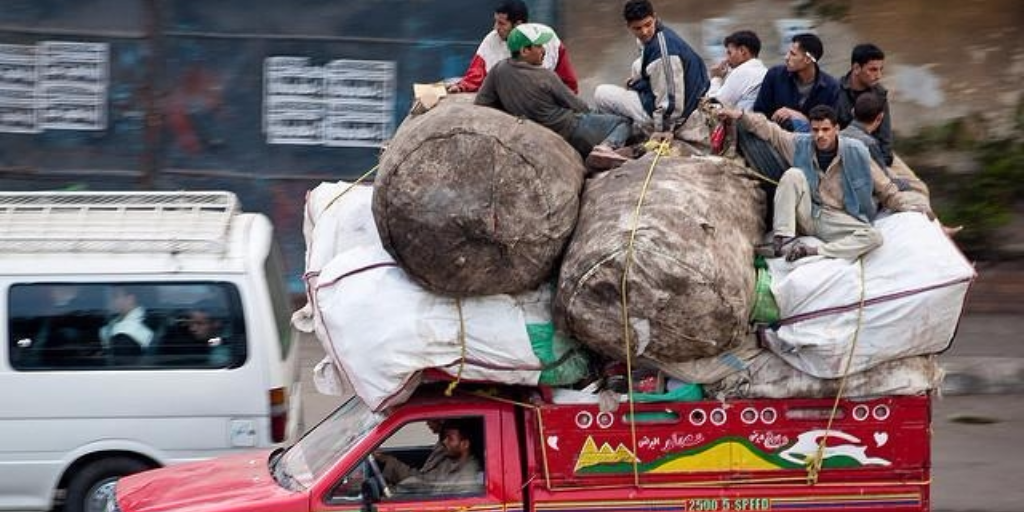The Ambassador of Switzerland to Egypt Markus Leitner and the Egyptian Minister of Environment Khaled Fahmy sealed a “National Solid Waste Management Programme” (NSWMP) deal last week, planned to be implemented across four governorates in the Upper Egypt and Delta regions.
The programme will serve the urban populations of Qena, Assiut, Kafr El-Sheikh and Gharbeya governorates, with a total of approximately 3.5 million residents. It aims to support the establishment and implementation of effective policy, legislation and institutional arrangements for municipal solid waste management at the national, governorate and local levels in Egypt, coupled with the implementation of related infrastructure in these four governorates.
The infrastructure implemented includes the construction and extension of waste treatment, recycling or composting facilities, landfills and transfer stations as well as the supply of equipment of waste collection and transportation.
The program involves different components in the waste sector, including electronic waste, hazardous hospital waste, and water treatment.
“You can look at waste as a problem… or as an opportunity,” Leitner stated, saying that the program will generate jobs, energy, and income. While the ambassador estimated that about 15,000 are to be created, Fahmi expounded saying that the program incorporates both direct and indirect jobs through collection, transportation, and recycling.
One issue raised between the ambassador and the minister is implementation.
“We want to make sure it is not just [involving] the infrastructure, but also [having] a sustainable impact,” Leitner told BECAUSE.
“Switzerland’s investment in the solid waste management sector underlines the Swiss commitment to protect the environment and the health and safety of Egyptian citizens,” said Leitner in a statement issued by the embassy.
NSWMP is jointly financed by the German Government via KfW development bank (as the lead financing institution) and GIZ, the European Union, the Swiss State Secretariat for Economic Affairs (SECO) and the Government of Egypt, with a total cost of EUR 66.5 million. The Swiss contribution will be a grant amounting to EUR 10.5 million dedicated to investment, technical assistance and capacity building.
The five-year programme will contribute to sustainable protection of the climate, environment and natural resources as well as reduction of health risks for the population of Egypt. It will start in 2016 and is expected to be completed by the end of 2021.
Meanwhile, Minister Fahmi said that the solid waste problem throughout Egypt needs support for newer systems. The newly set national strategy, approved last month by the cabinet, allocated three billion EGP over a course of two years for solid waste issues.
However, the private sector should play a role, Fahmi said.
“We believe that the system should be financed by the private sector, like in all other countries. The private sector provides the collecting, transportation, and management services in exchange for fees collected from the people,” he said, adding that the government would support if a financial gap appears.
“Foreign partners aid [only] with first steps,” Fahmi asserted.
The minister spoke to BECAUSE about efforts to incorporate the zabaleen, or the “scavengers” as Fahmi dubbed them. “They have to be part of the system,” he stated.
“We cannot address a [the solid waste] problem that has new features, because of the socioeconomic changed conditions, with the same old ‘zabaleen’ method,” Fahmi beleieves, saying that “the zabaleen will be there, but they will be in another advanced system.”
Giving an example of changed circumstances, the minister said that the zabaleen used to have their own segregated area in Moqattam. Now Moqattam is in the heart of Cairo, which means they have to move away, making the transport line longer.
“You cannot do it with a carriage and donkey any more. You have to introduce cars. Using cars in the business means using fuel, needing maintenance, and employing drivers,” he said.
“We have had our negotiations with them, and they are willing to cooperate, especially in Cairo,” Fahmi told BECAUSE, stressing that indeed the ministry is embarking on a design for a new system in Greater Cairo.







Comment (1)
[…] Leitner, et le ministre égyptien de l’Environnement, Khaled Fahmy, se sont entendus sur un « National Solid Waste Management Progamme » (NSWMP). Ce programme concerne quatre gouvernorats de Haute Égypte et du Delta (Qena, […]